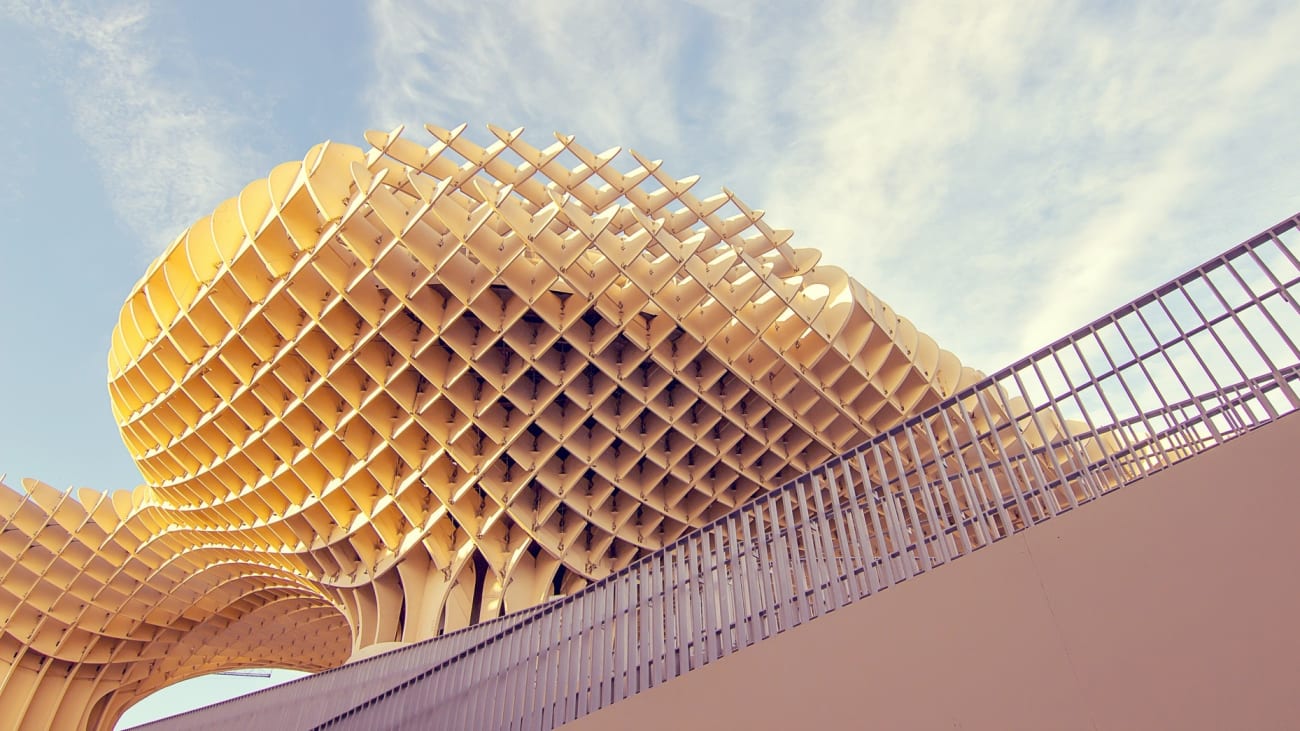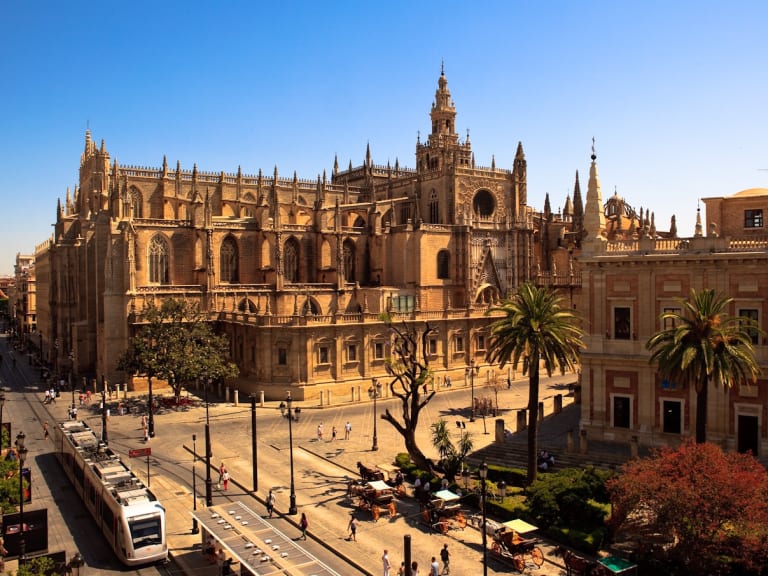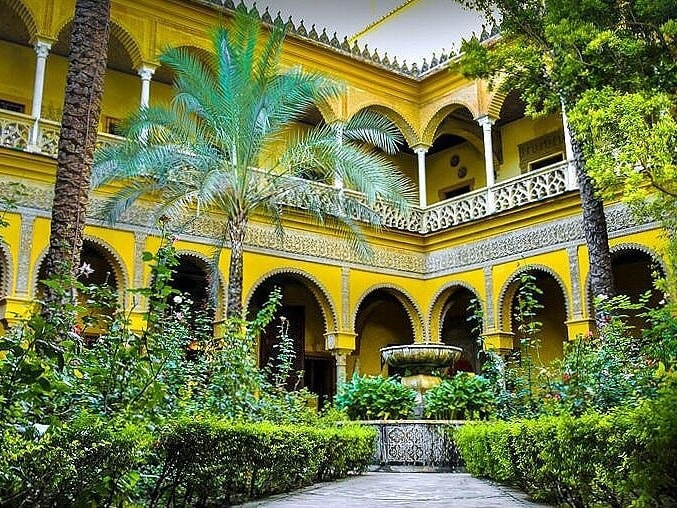10 Best Monuments in Seville
If you are planning a trip to the capital of Andalusia, it is important to know which monuments and places are a must on a tour.

Seville mushrooms | ©Javier Gonzalez
One of the best things to see and do in Seville is a tour of the city's monuments. I personally consider this to be one of the best ways of sightseeing in Seville and of being able to connect with its past and cultural evolution.
Below, I will tell you everything you need to know about the most outstanding monuments in the city; from squares to palaces, from public buildings to religious temples. Seville is a city brimming with charm, so enjoy it!
1. Seville Cathedral and the Giralda

Seville Cathedral is the city's most important religious building and the largest Gothic monument in the world. Built on the remains of an ancient mosque, a visit to tour the Cathedral is a must on any visit to the Andalusian capital.
For its part, the Giralda is Seville's most iconic monument, present on postcards and on the covers of books about the city. It is one of the most visited monuments by tourists, as from the top of its bell tower you can get wonderful views of the entire historic centre.
Where it is and how to get there
Located in Avenida de la Constitución, in the heart of the old quarter of Seville. You can get there using the metro (line 1) to Puerta de Jeréz station. You can also take the tram and get off at the neighbouring Archivo de Indias.
Useful information
- Opening hours: Tuesday to Saturday from 11am to 5pm; Sundays until 6pm and Mondays until 3.30pm. During the summer months in Seville it is open to the public with extended opening hours.
- Price: From €9 for an adult ticket.
2. Royal Alcazar of Seville

The palace shows remnants of the Mudejar style, a unique architectural style in Andalusia that blends influences of European Renaissance architecture with the uniqueness, character and aesthetics of Muslim architecture.
Due to these characteristics it is not surprising that the Alcázar of Seville is one of the most visited attractions in the city.
It is also one of the oldest and best preserved palaces in the world and a must-see on any tour of Seville.
Where it is and how to get there
The Palace is located in what is known as the Patio de Banderas, in the historic centre of Seville.
If you want to get to this area of the city by metro, you can do so on line 1, the nearest station being Puerta de Jerez or, if you prefer, take the tram and get off at the Archivo de Indias.
Useful information
- Opening hours: The palace is open to the public from Monday to Sunday, between October and March from 09:30h until 18:00h and from April to September extended opening hours until 20:00h.
- Price: The average adult ticket costs around €15.
3. Triana Bridge

The bridge that connects the old town of Seville with the popular and beautiful neighbourhood of Triana was declared a historical monument in 1976.
A visit to the Triana neighbourhood across the bridge is a must for all first-time visitors to the city who want to marvel at its charm.
Where it is and how to get there
Located between the old part of Seville and Triana, the easiest way to get to this area of the city is to walk or take the Seville bus. In the latter case, my advice is to get off at the stop just in front of the Plaza de Toros and walk for about 5 minutes along the riverbank.
Useful information
- Opening times: Always open.
- Price: Free of charge.
4. Golden Tower

This ancient stone tower was built next to the Guadalquivir River as a defensive element against enemy ships. Its name is due to the fact that in former times it was covered with small tiles which, in the sunlight, gave off a golden reflection in the distance.
This place offers some of the best views of Seville and also houses the Naval Museum.
Where it is and how to get there
Located on the Paseo de Cristóbal Colón, on the banks of the Guadalquivir River, you can reach this area of the city using the Seville metro (line 1) or the public bus service (lines 3, 15, 31 and 21).
Useful information
- Opening hours: The viewing tower and museum are open all year round. Monday to Friday from 09:30h to 18:45h and weekends from 10:30h to 18:45h.
- Price: Available from €3 for an adult ticket; the attraction is free for children under 6 and free for the general public on Mondays only.
5. Pilatos House

Exhibiting a clear blend of Mudejar art and Renaissance style, the Casa de Pilatos and its courtyard-gardens is the perfect prototype of the Andalusian palace, a clear evidence of how the mixture of architectural styles is part of the city's hallmark.
The work is beautifully preserved, so if you have two or three days to tour Seville this is one historical attraction you won't want to miss.
Where it is and how to get there
Located in the Plaza de Pilatos, the quickest way to get to this part of the city is simply to walk, although you can also use the Seville bus service (lines 1, 21 and 24).
Useful information
- Opening times: There are two timetables depending on the season. From November to March from 09:00h to 18:00h; from April to October from 09:00h to 19:00h.
- Price: For a full tour, an adult ticket is available from €12.
6. Archive of the Indies

In the vicinity of the Cathedral and the Alcázar is a beautiful building dating from 1785 and declared a World Heritage Site by UNESCO. The building was commissioned to house the documentation pertaining to the Conquest of America and the Philippines.
The documentation is impressive to say the least, as the archives consist of 43,000 folders and some 8,000 maps.
Where it is and how to get there
A visit is highly recommended, firstly because of its easy location and secondly because of the speed of the tour. The Archivo de Indias is located in the Avenida de la Constitución, in the heart of the historic centre of Avila.
If you arrive by metro, the nearest stop is Puerta de Jerez, while the city tram has a stop just opposite.
Useful information
- Opening times: Closed on Mondays; Tuesday to Saturday from 09:30h to 16:45h; Sundays and public holidays from 10:00h to 13:45h.
- Price: The monument is free of charge to all visitors.
7. Palacio de las Dueñas

A beautiful Andalusian palace belonging to the Alba family. Built between the 15th and 16th centuries, it is well worth a visit to tour the carefully preserved interiors despite its age and also to admire the fabulous collection of art on display in the different rooms.
The courtyards and gardens are characterised by lush and luxuriant vegetation that you are sure to enjoy.
Where it is and how to get there
The Palace is located in Calle Dueñas, in the old town of the Andalusian capital. You can get there using the city's public bus service (lines 1,21,32, C1 and C4), although this area of the city, characterised by its narrow streets, is ideal for walking.
Useful information
- Opening hours: The opening hours of this attraction vary slightly depending on the time of year you decide to visit. From April to September the opening hours are from 10am to 8pm daily; from October to March the closing time changes to 6pm.
- Price: An adult ticket costs approximately €10; the attraction is free on Mondays from 4pm and all the time for children under 6 years old.
8. La Cartuja Monastery

Founded in the 15th century by Archbishop Gonzalo de Mena, the Monastery has had various uses over the years. Nowadays it is worth going to this area of the city to enjoy the location on the island of La Cartuja for its historical relevance, as this was the place where Columbus lived when he planned his voyage to America.
It is also the current home of the Andalusian Centre of Contemporary Art.
Where it is and how to get there
It is located on the Isla de la Cartuja, a neighbourhood on the left side of the river where Expo 92 was held.
The best way to get there is to take the C1 bus to the Américo Vespucio stop, located just a 4-minute walk from the entrance to the monastery.
Useful information
- Opening times: Closed on Mondays; Tuesday to Saturday from 10am to 6pm, Sundays and public holidays from 10am to 3.30pm.
- Price: Approximately €2 for admission to enjoy the monument and the temporary exhibitions.
9. Palace of the Countess of Lebrija

Although the exterior façade of the Palacio de la Condesa may make you confuse the building with the rest of the typical stately homes in Seville, its impressive interiors constitute one of the hidden gems of the Andalusian capital.
As you walk through it you will come across Roman mosaics rescued from convents and palaces in ruins, of incalculable historical and cultural value. The most beautiful is undoubtedly the mosaic of the God of Bread that makes up the entire main central courtyard of the palace - marvellous!
Where it is and how to get there
The Palace of the Countess of Lebrija is located at Calle Cuna 8; old quarter of Seville.
The way to get there is by taking the city bus to the bus stop called Laraña, in the Plaza de la Encarnación, just 2 minutes away.
Useful information
- Opening hours: From Monday to Friday the palace is open to the public from 10:30h until 19:30h except during the months of July and August when the opening hours are reduced to 15h. Saturdays from 10am to 2pm and closed on Sundays.
- Price: An adult ticket for the full tour is available from €12 per person; admission is free only on Fridays at 10am.
10. Plaza España

Built for the 1929 Ibero-American Exhibition, the Plaza España is a work of monumental proportions and an icon of the city of Seville that you must see during your trip.
Just like the Giralda, this is a place in the city much photographed by travellers and amateurs looking to capture the beauty of Seville, not to mention that this location has served as a backdrop for major Hollywood productions.
In addition to its sheer size, Plaza España will quickly grab your attention for other reasons: 1st, its location right on the banks of a large 500-metre-long canal, and 2nd, the imposing architecture that surrounds it.
Where it is and how to get there
Plaza España is located within the boundaries of the Parque de María Luisa and the best way to get to this part of the city is to take the Seville metro to the Prado San Sebastián station. You can also take the bus to the Paseo Las Delicias bus stop, which is just a 5-minute walk away.
Useful information
- Opening hours: Every day from 08h to 22h.
- Price: Admission free of charge.
